Gone are the days of archaic security measures and constant worries about data breaches in healthcare organizations. HIPAA-compliant email providers make healthcare communication safer while meeting all regulatory compliances.
We’ve compiled a list of 12 HIPAA-compliant email services that make HIPAA compliance a breeze even for the most tech-averse team members.
So, gear up, and let’s find the best HIPAA-compliant email solution for your healthcare practice.
Why is HIPAA-compliant Email Important?
When it comes to digital communication, respecting privacy and ethical handling of data is extremely crucial. Apart from the legal standpoint, here’s why HIPAA-compliant emails are a must for a healthcare organization:
- They simplify the sharing of confidential updates for faster coordination and efficient care;
- Compliant systems protect healthcare organizations and covered entities from severe penalties due to HIPAA violation;
- Privacy-first approach towards PHI improves patient trust and boosts organizational reputation.
Why Do We Need HIPAA-compliant Email Service?
Healthcare organizations and covered entities should follow various laws and regulations outlined by the Health Insurance Portability and Accountability Act.
Here’s how a HIPAA-compliant email service helps stay HIPAA-compliant:
- Patient data protection. Safeguards sensitive patient information (PHI) from unauthorized access, breaches, or cyber threats;
- Legal compliance. HIPAA regulations mandates healthcare organizations to implement appropriate safeguards for protecting PHI;
- Risk mitigation. Reduces the risk of data breaches, which can lead to severe financial penalties and reputational damage;
- Secure communication. Enables healthcare providers to communicate sensitive data with patients and other providers safely;
- Audit trail and accountability. Provides detailed logs and tracking capabilities to monitor and control access to PHI.
A HIPAA-compliant email service helps healthcare companies meet all the privacy and security rules & regulations under HIPAA.
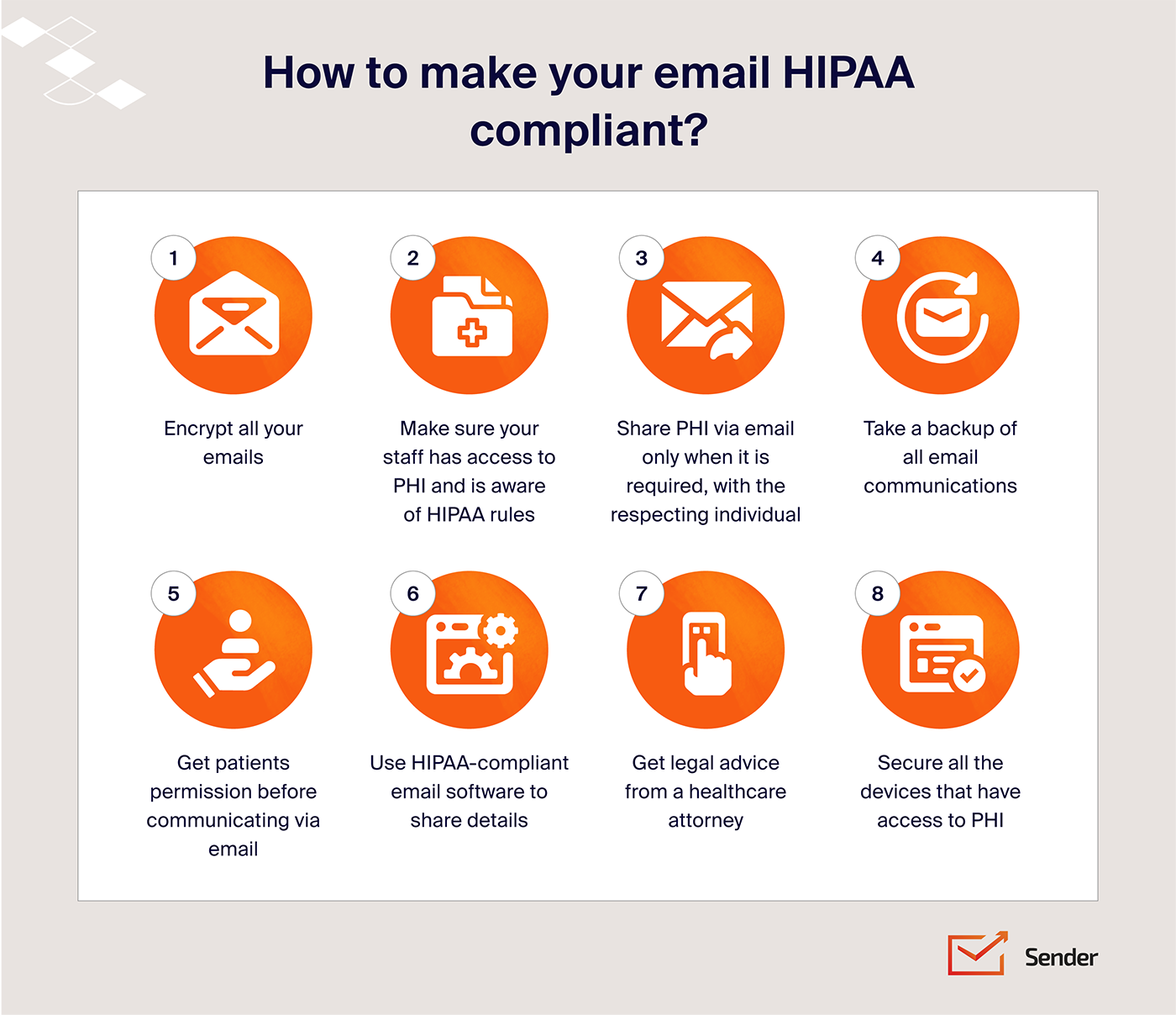
Types of HIPAA-compliant Email Providers
HIPAA-compliant email service providers vary in approach and features to cater to different organizational sizes, technical capabilities, and industry requirements.
Here are the most common types of HIPAA email service providers:
- Enterprise-level providers. Comprehensive email solutions for large organizations, offering advanced security features and integration with other business tools;
- Specialized healthcare communication platforms. Purpose-built for the healthcare industry, these platforms include features like patient portals and secure forms alongside HIPAA-compliant email;
- Encrypted email add-ons. Tools that work with existing email services to add encryption capabilities for HIPAA compliance of standard email platforms;
- Secure messaging services. Focused on secure communication, often including email-like features alongside real-time messaging and file-sharing capabilities;
- Email encryption gateways. Server-level solutions that automatically encrypt outgoing emails and provide data loss prevention (DLP) features;
- Open source solutions. Customizable and often free, these solutions are for organizations with the technical expertise to implement and maintain them;
- Cloud-based secure email providers. Hosted email solutions offering secure, web-based access with built-in compliance and email archiving tools.
Learn all about HIPAA-secure email: How to Send and Ensure Compliance.
12 Most Popular HIPAA-compliant Email Providers
If you’ve been searching for a reliable solution to send and receive secure messages, we’ve got you covered. Here’s a list of popular email service providers offering HIPAA compliance.
- Sender
- Paubox
- Virtru
- LuxSci
- NeoCertified
- MD OfficeMail
- SendItSecure
- Zix
- ProtonMail
- Citrix Secure Mail
- Mimecast
- Aspida Mail
Let’s look at their features to explore which one’s a fit for your organization.
Sender — Simple & Secure Email Service Provider
Sender is a popular email solution known for its intuitive interface, fantastic customer support, and robust security infrastructure. The solution combines all the benefits of modern email marketing tools with on-demand HIPAA compliance.
From a single dashboard, you can create and send emails, automate transactional emails, and schedule follow-up campaigns. There’s even a form builder for gathering required information from patients.
Sender seamlessly integrates with your existing email clients and saves you from the hassles of building a secure and compliant communication system for your healthcare organization.
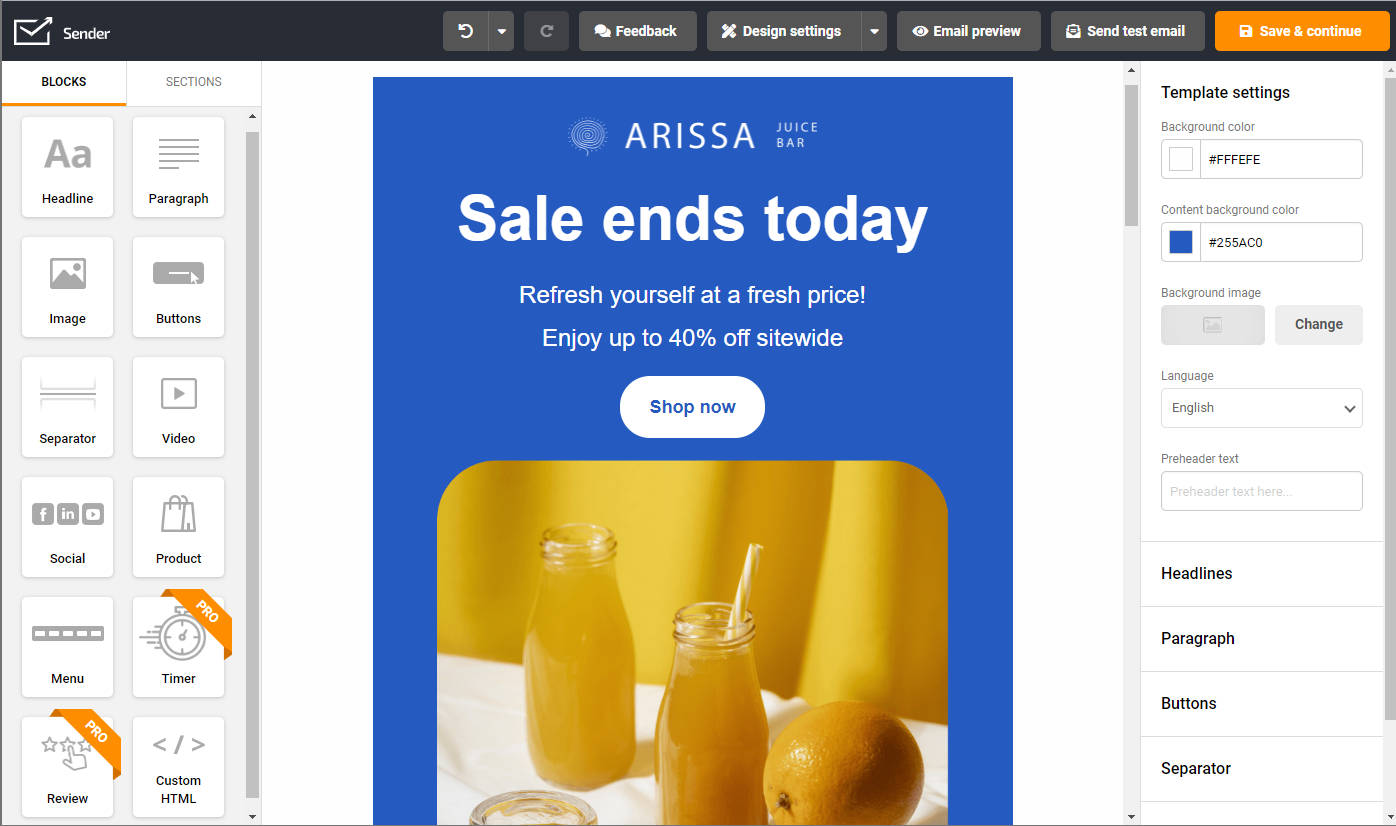
Key Features
- Design & send marketing emails with ePHI;
- Relevant BAA agreement;
- AES 256 encryption for emails;
- Regular data backups & recovery;
- Integration with digital healthcare platforms.
Pros & Cons
| Pros | Cons |
| Integrates with existing systems/infrastructure | No landing page builder |
| Fast customer support (less than a minute response time) | |
| Built-in marketing automation features |
Plans & Pricing
On-demand pricing model for HIPAA-compliant email service.
Paubox — Seamless Email Encryption Integration
Paubox is a seamless solution that turns your standard email platform into a HIPAA-compliant email provider.
This tool integrates with your existing Google Workspace and Microsoft 365 accounts to ensure regulatory compliance while maintaining a familiar email workflow. It automatically encrypts all outgoing emails without extra login or dashboards.
You can also gather data using its in-built forms. There’s support for transactional and marketing emails, too.
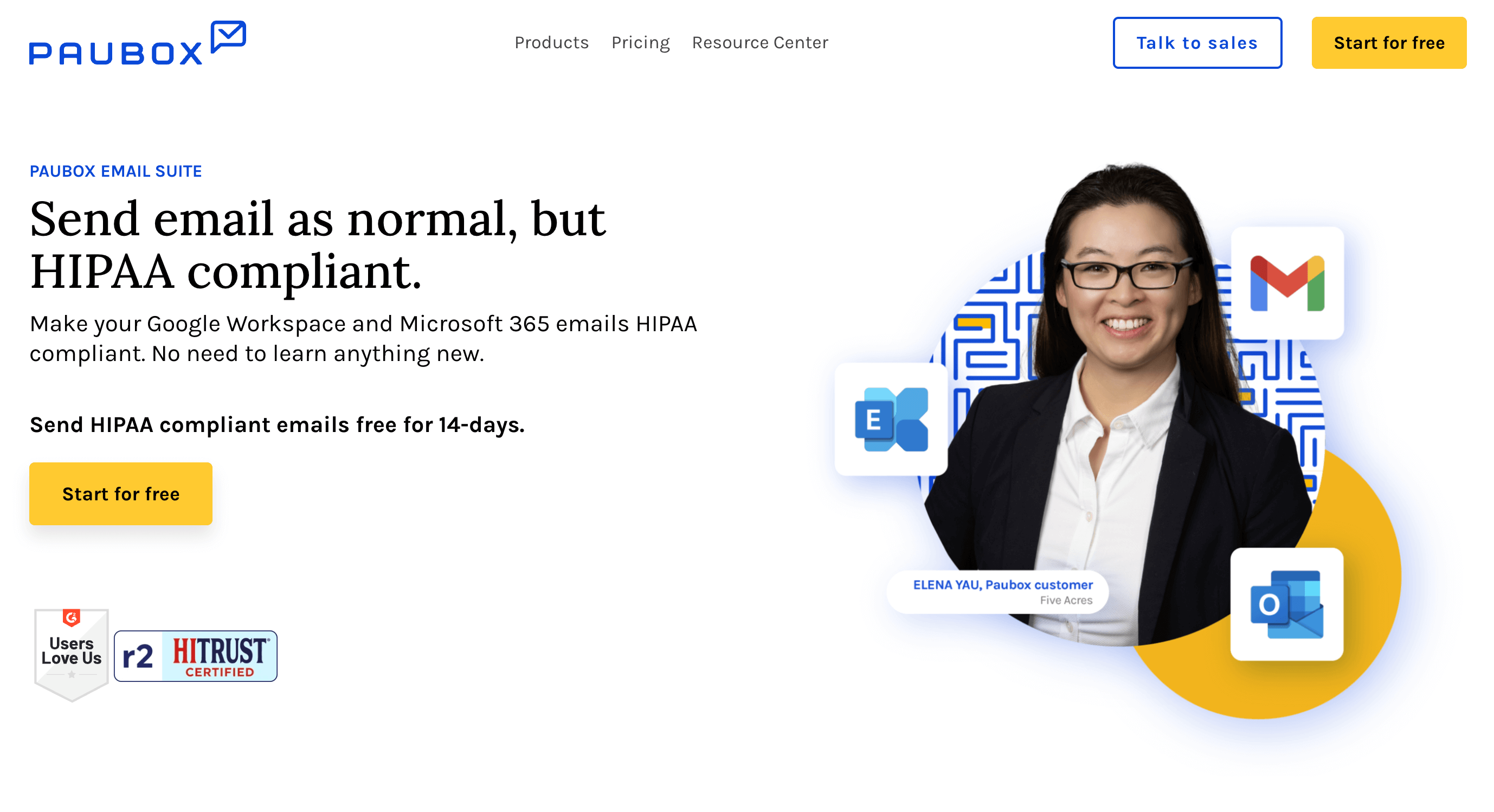
Key Features
- Automatic email encryption;
- Transactional and programmatic emails;
- Secure patient data collection forms;
- HIPAA-compliant text messages;
- Integration with Google Workspace and Microsoft 365.
Pros & Cons
| Pros | Cons |
| Easy setup & integration | Pay separately for each part of the package (API, marketing, transactional email) |
| Minimal learning curve & training | Limited to Google Workspace/Microsoft 365 only |
| In-built SMS & forms | Basic reporting dashboard |
Plans & Pricing
- No free plan or trial;
- Paid plans start at $29/month for up to 5 senders.
Virtru — Easy-to-Use Encryption Tools
Virtru is an encryption tool for healthcare communication designed to protect Protected Health Information (PHI).
The platform integrates with all primary email services, cloud storage solutions, and CRM tools for complete HIPAA compliance. Virtru is known for granular access control, real-time audit capabilities, and large file sharing, making it easy to secure sensitive information.
Like all other platforms on the list, you’ll find all essential features to maintain control and limit visibility, mitigating breach risks.
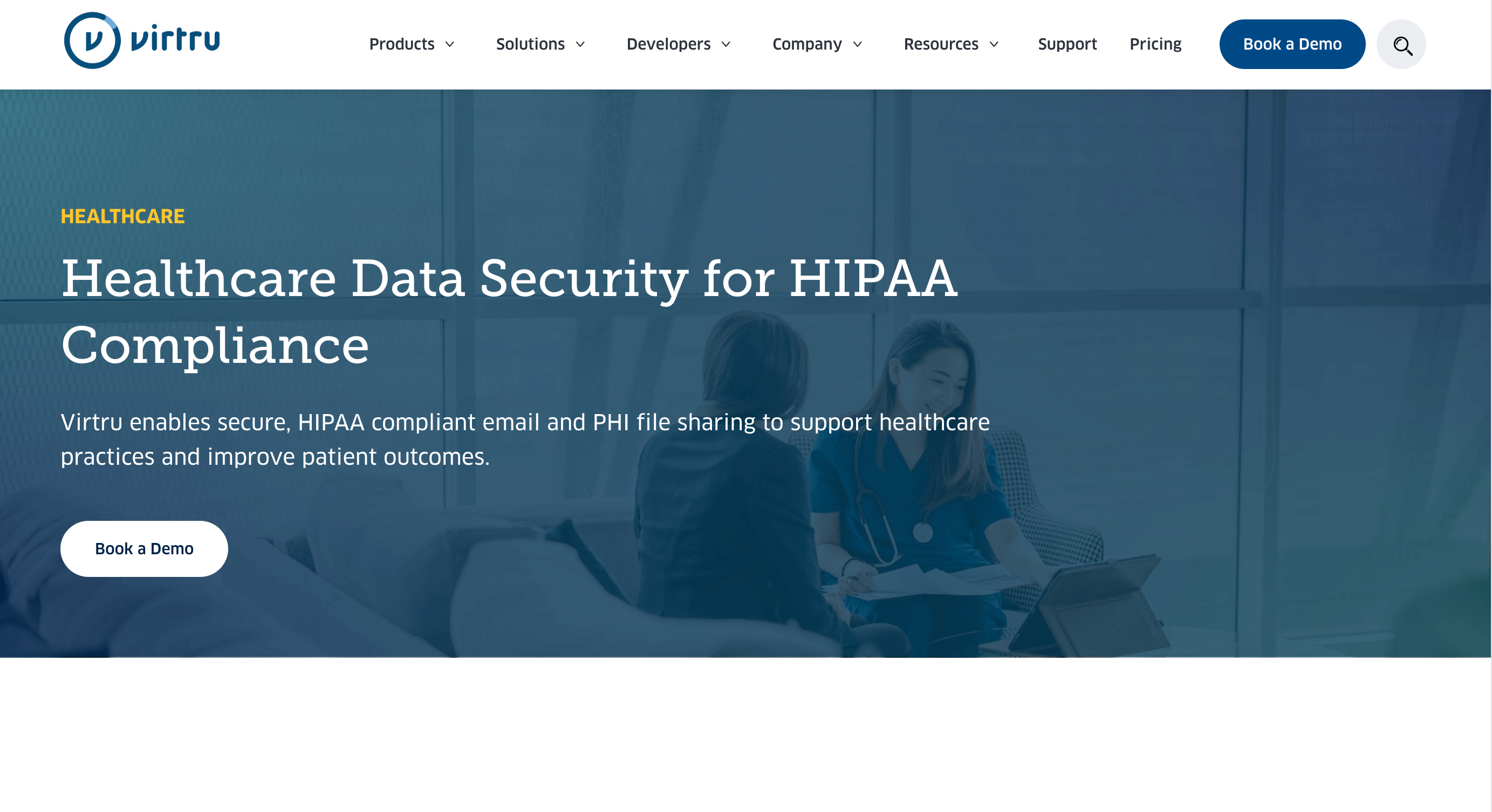
Key Features
- End-to-end encryption for emails and files;
- Gmail, Outlook, Google Drive, and Salesforce integrations;
- Data Loss Prevention (DLP) policies;
- Access revocation and control;
- Secure large file sharing up to 15 GB.
Pros & Cons
| Pros | Cons |
| No-install solution for out-of-network professionals or patients | Receivers need to take additional steps to access emails |
| Custom branding options | Pricing changes based on feature requirements |
| CRM & ERP integrations | Complex email recall process |
Plans & Pricing
- Paid plans start at $119/month for up to 5 users without secure file sharing.
LuxSci — Offers Secure Web Forms
LuxSci is a HIPAA-compliant email service known for secure email hosting and web forms. Its proprietary compliance technology automatically encrypts all outgoing emails, protecting sensitive patient data.
LuxSci offers both email client and hosting solutions to ensure integrated compliance for healthcare companies. To top it all, secure web forms with features like ink signature, custom fields, etc., enhance its functionality. So, you can use the omnichannel solution for information gathering and communication.
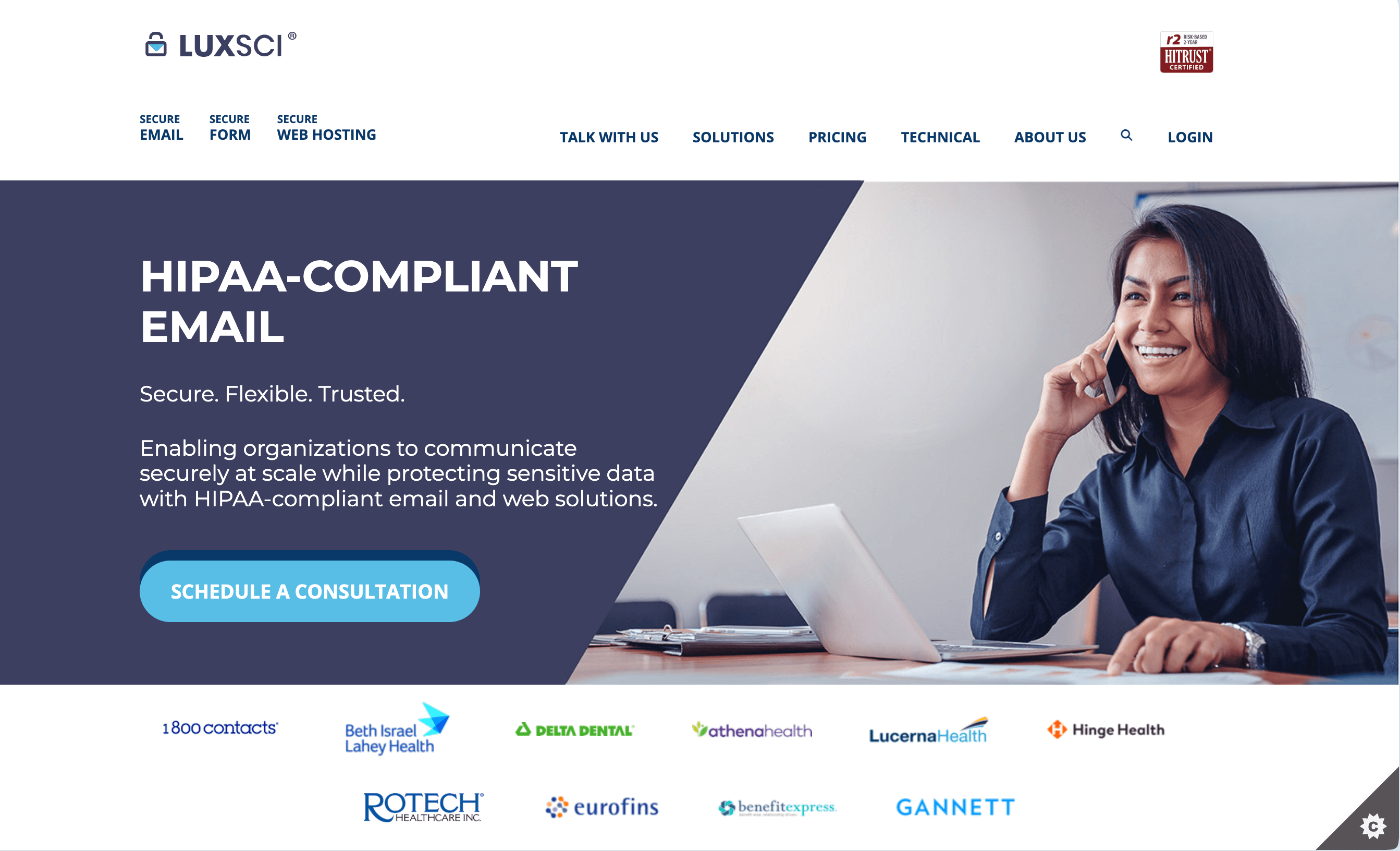
Key Features:
- Automatic email encryption;
- HIPAA-compliant email hosting;
- Secure web forms with ink signature capability;
- Multiple encryption methods support;
- Integration with existing email and web systems.
Pros & Cons
| Pros | Cons |
| Email, web forms, & hosting — all in one | Outdated user interface |
| Zero trust model for isolating every email server | Complex pricing model |
| Prompt customer support | Questionable email spam protection |
Plans & Pricing
Custom pricing model based on organizational requirements, available on request.
NeoCertified — Has Business Associate Agreement
NeoCertified offers a comprehensive HIPAA-compliant email solution with military-grade encryption and seamless integration with popular email clients.
The platform can transform any email workflow into a secure, compliant communication channel without sacrificing ease of use or functionality.
There’s a secure web portal and email client integration to protect emails from phishing attacks and malicious emails and ensure HIPAA compliance. With a mobile app, you can be sure of HIPAA-compliant email operations even when team members are outside the office.
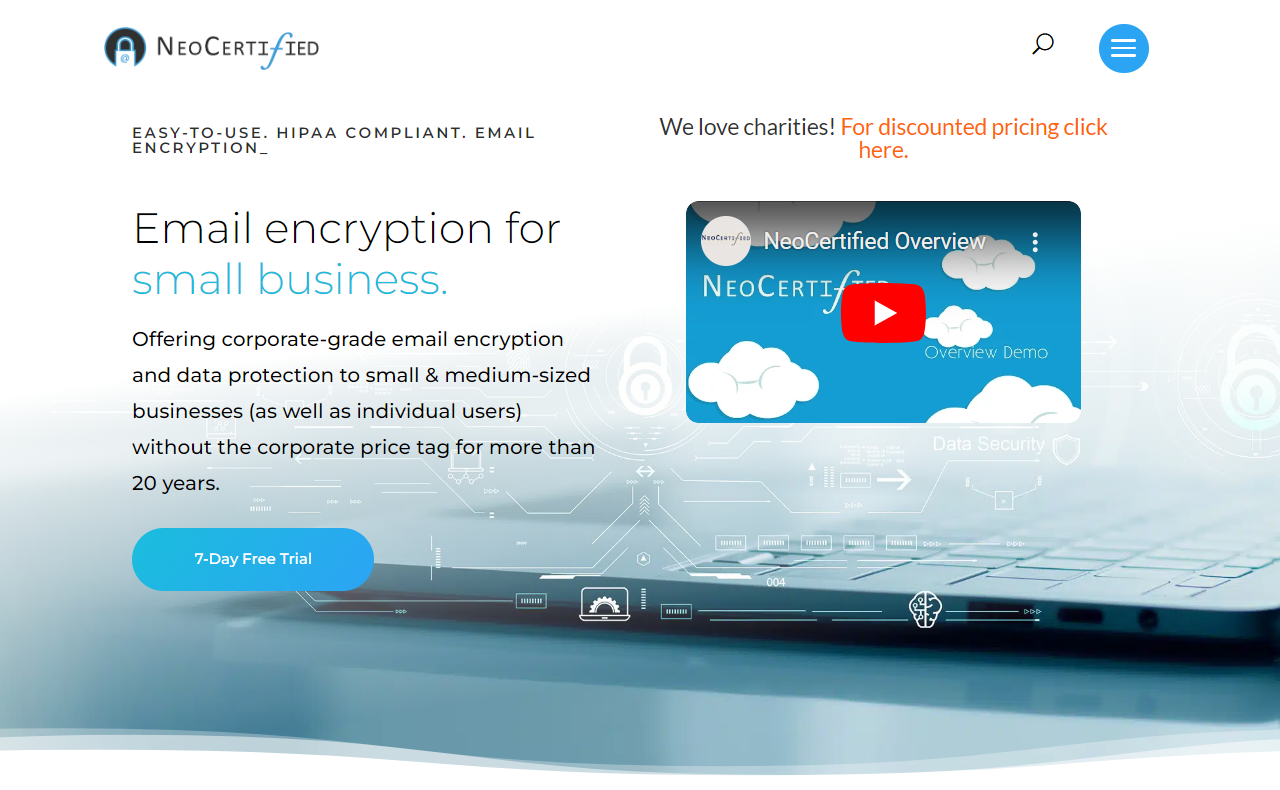
Key Features
- HIPAA-compliant, military-grade encryption;
- Integration with popular email applications;
- Secure web portal for email and file sharing;
- Large file transfer capabilities (up to 1GB);
- Mobile app for email transmission security.
Pros & Cons
| Pros | Cons |
| Email tracking and notifications | Slow email search |
| Easy setup and quick integrations | Restrictive file size limit |
| Quick customer support | Not mobile-friendly |
Plans & Pricing
Standard plan starts at $99/user annually for unlimited HIPAA-compliant emails.
MD OfficeMail — Tailored for Healthcare Professionals
MD OfficeMail is a simple HIPAA email service designed for serious professionals running small independent practices and large hospitals.
It comes with several customizable security options based on the organization’s needs. It helps meet all the guidelines mentioned in HIPAA compliance’s security, privacy & breach notification rules.
There’s legal archiving to store all emails, routine audit controls, two-factor authentication, and even a customizable encryption level for any outbound email.
<
figure class="wp-block-image aligncenter size-full is-resized"><img loading="lazy" decoding="async" width="2744" height="1628" src="https://www.sender.net/wp-content/uploads/2024/08/MD-OfficeMail-hipaa-compliant-email-service-provider.png" alt="MD-OfficeMail-hipaa-compliant-email-service-provider" class="wp-image-20741" style="width: 800px; border:3px solid #eeeeee; padding:3px; margin:3px;""/>
Key Features
- Integration with popular email clients (e.g., Outlook);
- Two-Factor Authentication (2FA);
- End-to-end encryption with AES 256-bit encryption;
- Legal archiving of all emails for compliance;
- Customizable encryption settings and user validation.
Pros & Cons
Pros Cons BAA and legal archiving Reports frequent glitches and downtime Flexible encryption options Slow and antiquated customer support All major email client integrations Outdated interface
Plans & Pricing
Plans start at $ 2.69/user monthly for up to 4 user accounts.
SendItSecure (Formerly Protected Trust) — Advanced Secure Messages
Send It Secure is a classic HIPAA-compliant email encryption solution that caters to healthcare, financial, legal, and other industries. It was earlier known as Protected Trust and offers seamless integration with robust security protocols.
The solution is designed to save healthcare professionals’ time while maintaining PHI’s integrity. It follows all HIPAA security protocols to prevent unauthorized access to sensitive information.
Message recall feature for delivered messages and the ability to set expiration dates provides an additional layer of control over Protected Health Information (PHI). Multiple recipient authentication methods help maintain the integrity and confidentiality of PHI as mandated by HIPAA regulations.
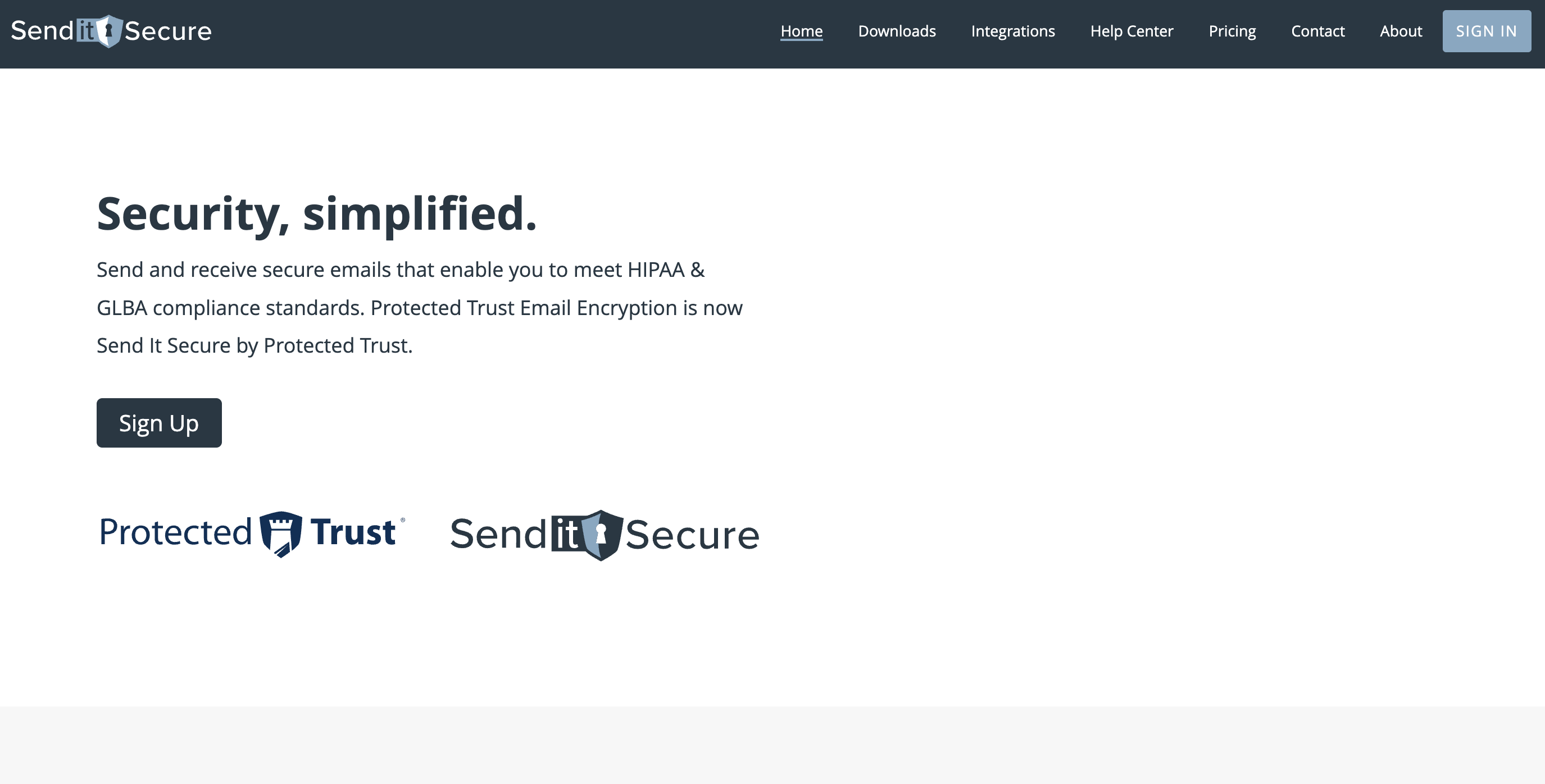
Key Features
- Microsoft Outlook Add-on for one-click encryption;
- Secure web portal for email access from any device;
- Delivery revocation and message expiration options;
- Multiple recipient authentication methods;
- iOS app and Windows client for convenient access.
Pros & Cons
Pros Cons iOS app & windows client Regular training required Delivery revocation feature Email search is complicated Custom email policies Every email requires a login
Plans & Pricing
- A free plan for up to 10 email sends for non-business users and 30-day retention time;
- Paid plans start at $15/month for unlimited messages and up to 10 years of data retention.
Zix — Comprehensive Email Encryption
Zix is an advanced email encryption solution designed for user-friendliness and comprehensive content filtering. It protects sensitive patient information on autopilot without needing users to follow complex procedures.
Its content filters scan all outgoing emails and attachments for PHI and apply encryption wherever needed to handle sensitive information. A user-friendly delivery system ensures encrypted emails are as easy to view/respond to as regular emails.
There’s a detailed reporting dashboard for HIPAA-compliant audit trails and even quarantine management for policy violations as a failsafe.
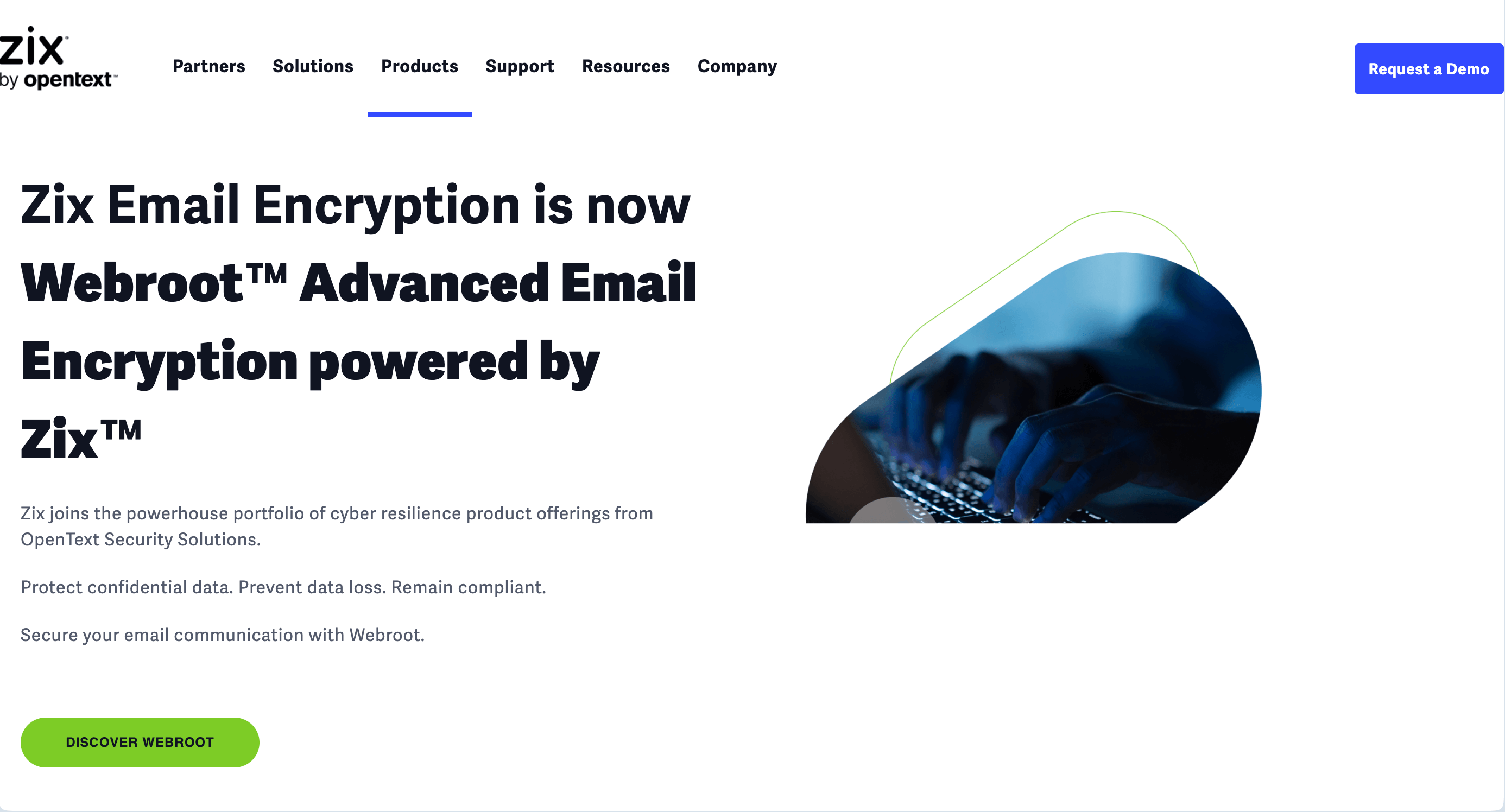
Key Features
- Automatic content filtering and encryption;
- Multiple delivery methods (transparent, pull, push);
- Integration with hosted and on-premise email systems;
- Quarantine management for policy violations;
- Detailed reporting for compliance and security teams.
Pros & Cons
Pros Cons Automatic encryption policies Complicated login process Flexible deployment Complex initial configuration Prompt customer support Slow at times (in transmission and access)
Plans & Pricing
The on-demand pricing model is based on custom requirements and is available upon request from the website.
ProtonMail — End-to-end Encrypted Email Services
ProtonMail is a popular service offering a 100% HIPAA-compliant email solution to preserve data integrity. It works with existing email clients, making it a convenient option for any organization seeking to protect patient information.
Its default end-to-end email encryption ensures PHI is always protected, including transmission and storage stages. There’s even an ability to send password-protected emails to external recipients outside an organization.
Its servers are located in Switzerland and guarded with strict data protection laws, providing additional protection for patient data. Features like PhishGuard & Hide My Email also help stay safe from cyber attacks.
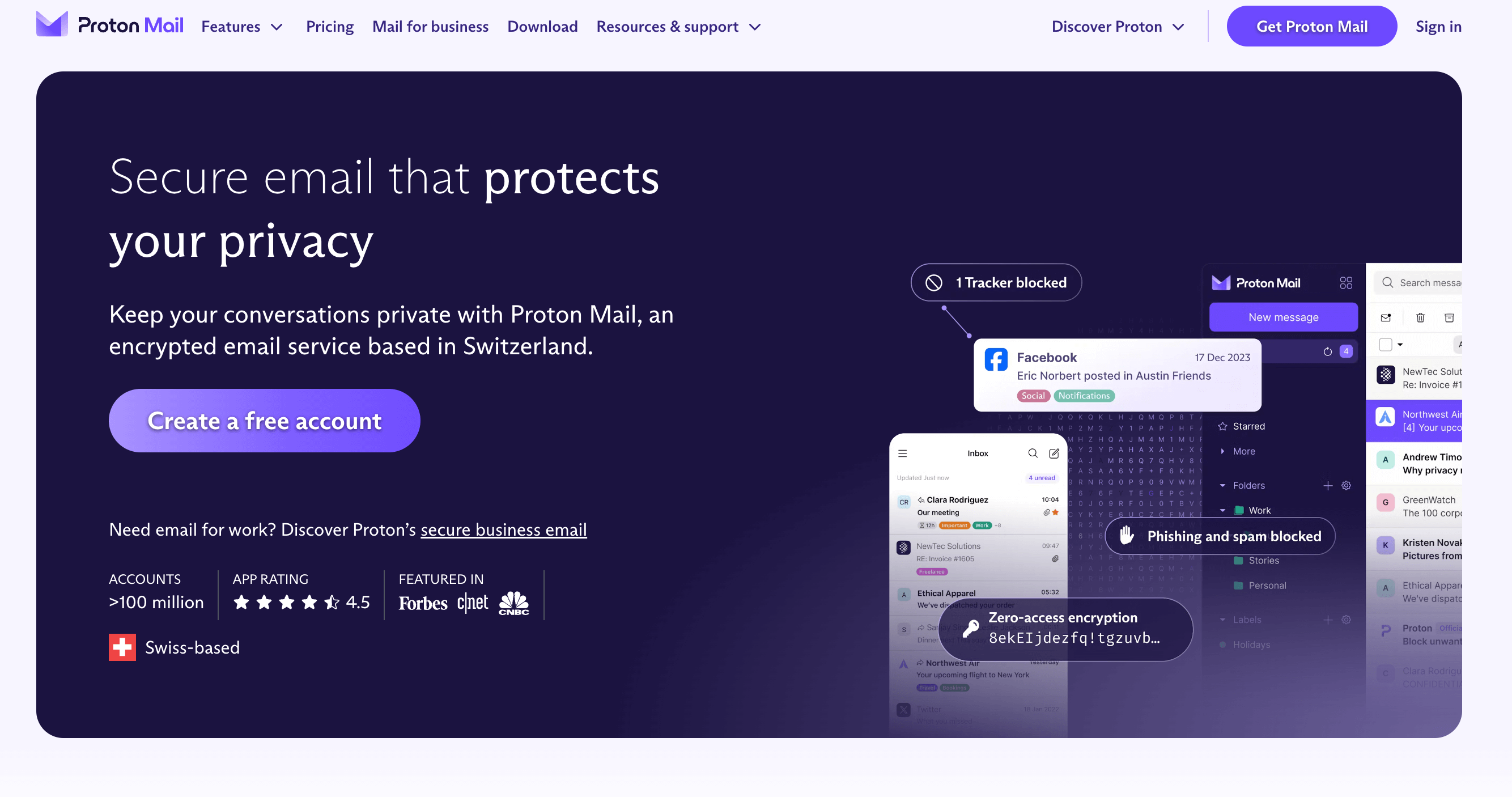
Key Features
- End-to-end encryption for all emails;
- Password-protected emails for external recipients;
- Integration with all desktop email clients;
- Mobile apps for iOS and Android;
- Customizable filters and organization tools.
Pros & Cons
Pros Cons Open-source and independently audited No subject line encryption Swiss-based servers No dedicated client (interface) for accessing emails and calendar Strong internal and external encryption Limited functionality on mobile devices
Plans & Pricing
Plans start at € 9.99/month for 1 user and 500 GB storage.
Citrix Secure Mail — Secure Email And File Sharing
Citrix Secure Mail is a secure email & file sharing solution to transmit electronic protected health information. It also offers multiple tools for managing calendars, emails, and contacts, even on mobile phones.
Citrix makes it easy to transmit information while maintaining compliance with technical safeguards through features like granular access controls, secure central data storage, factor authentication, etc.
The platform is primarily known for integration with Citrix suite of apps and is also compatible with all popular electronic health record (EHR) systems.
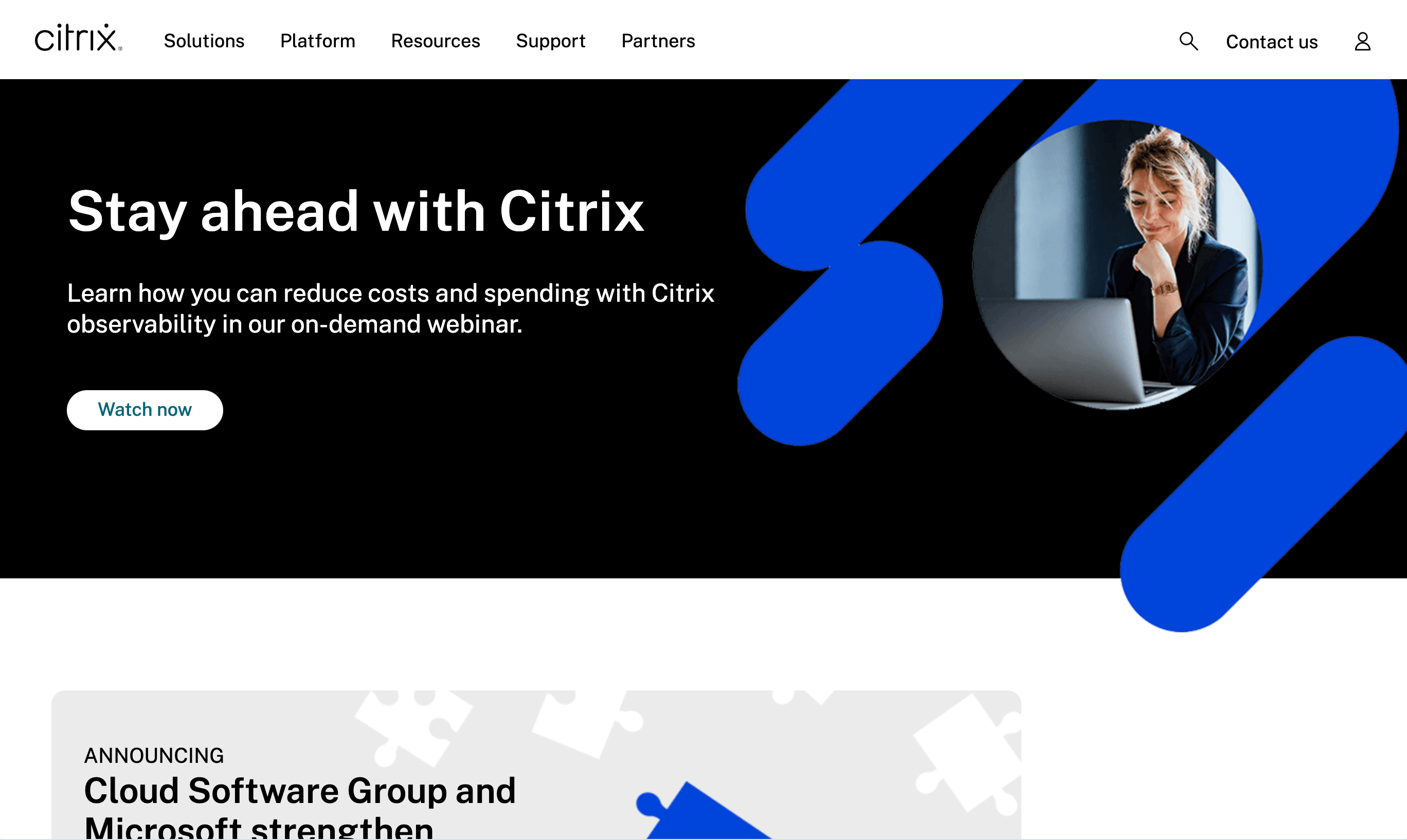
Key Features
- Single sign-on (SSO) compatibility with Citrix Secure Hub;
- Automatic app push to user devices upon enrollment;
- Secure access to EHR systems from any device;
- Granular access control for third-party users;
- Secure data center storage rather than on endpoint devices.
Pros & Cons
Pros Cons SSO and smart card authentication May require investment in the broader Citrix ecosystem Beginner friendly UI Potential learning curve Flexible configuration process based on the size of the organization Deployment complexity may require specialized IT support
Plans & Pricing
On-demand pricing model based on custom requirements, available on request from the website.
Mimecast — Email Security with Encryption and Archiving
Mimecast is an all-inclusive secure email solution for HIPAA compliance. It offers encryption, data leak prevention, and archiving capabilities.
A standout feature of Mimecast is the use of AI for threat detection for protection against phishing, ransomware, and business email compromise (BEC) attacks. Administrators can set predefined criteria for HIPAA compliance during transmission.
You also get granular message control, access revocation, and the ability to set email expiration dates. Plus, you can use archiving features to maintain readily accessible backups for all electronic PHI records.
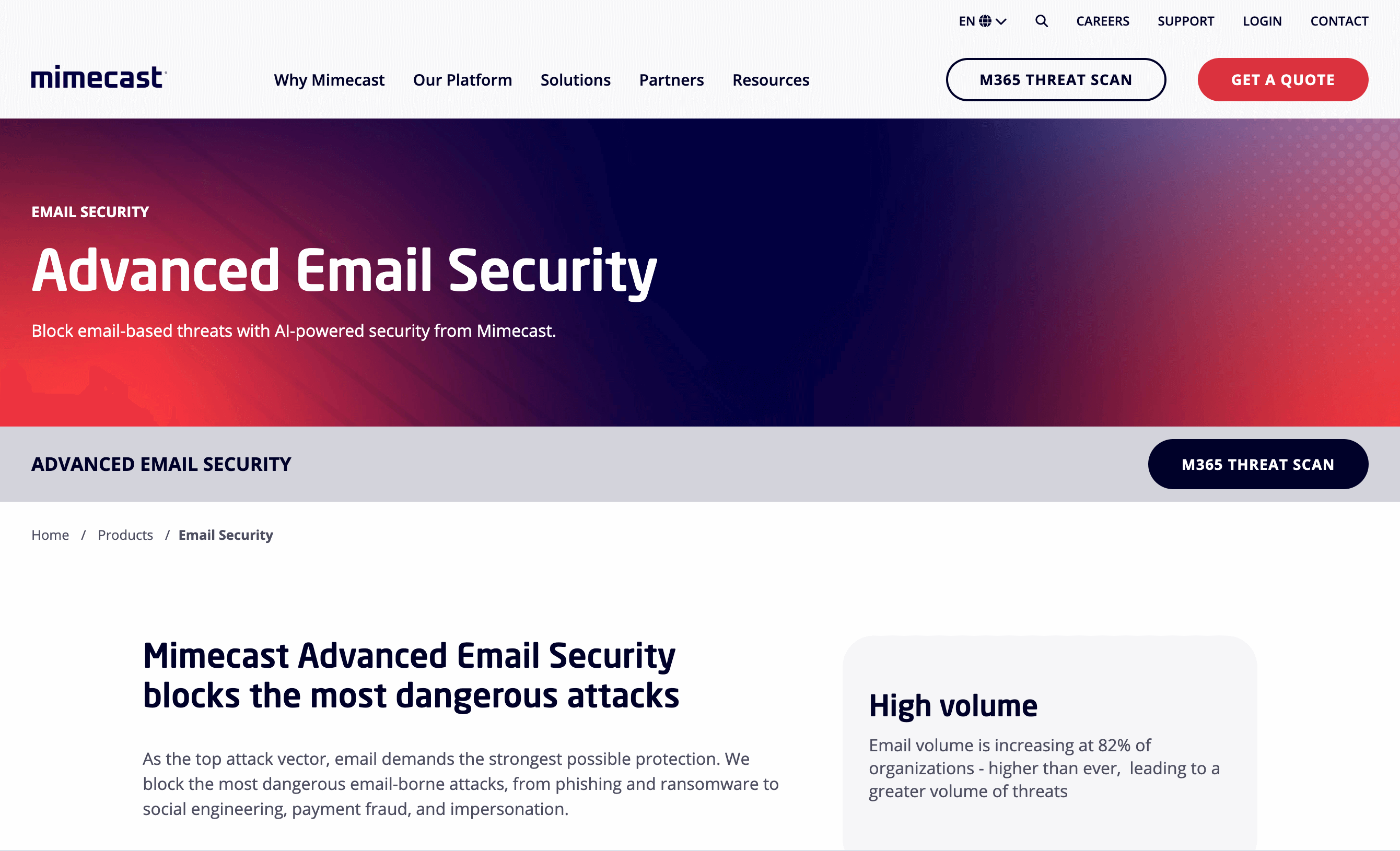
Key Features
- AI-powered threat detection and analysis;
- Automatic encryption based on customizable criteria;
- Data leak prevention and compliance policy scanning;
- Customizable, secure web portal;
- Flexible deployment options.
Pros & Cons
Pros Cons AI-driven security measures May require ongoing configuration Automatic backups and archiving Advanced features may come at a higher cost Option to password protect large attachments Recipient instructions are confusing for some users
Plans & Pricing
On-demand pricing model based on custom requirements, available on request from the website.
Aspida Mail — HIPAA-compliant Encrypted Email
Aspida Mail is a simple HIPAA-compliant encrypted email solution known for automatic encryption and strong backup and retention policies.
Deemed one of the simplest solutions out there, it uses AES-256 encryption for all emails in transit and rest. The automatic encryption feature scans for sensitive information like social security number, subscriber ID, etc., within email and helps prevent accidental disclosure of PHI.
There’s a long retention policy of 6 years, in line with HIPAA requirements, and it’s also compatible with all healthcare software for an easy setup.
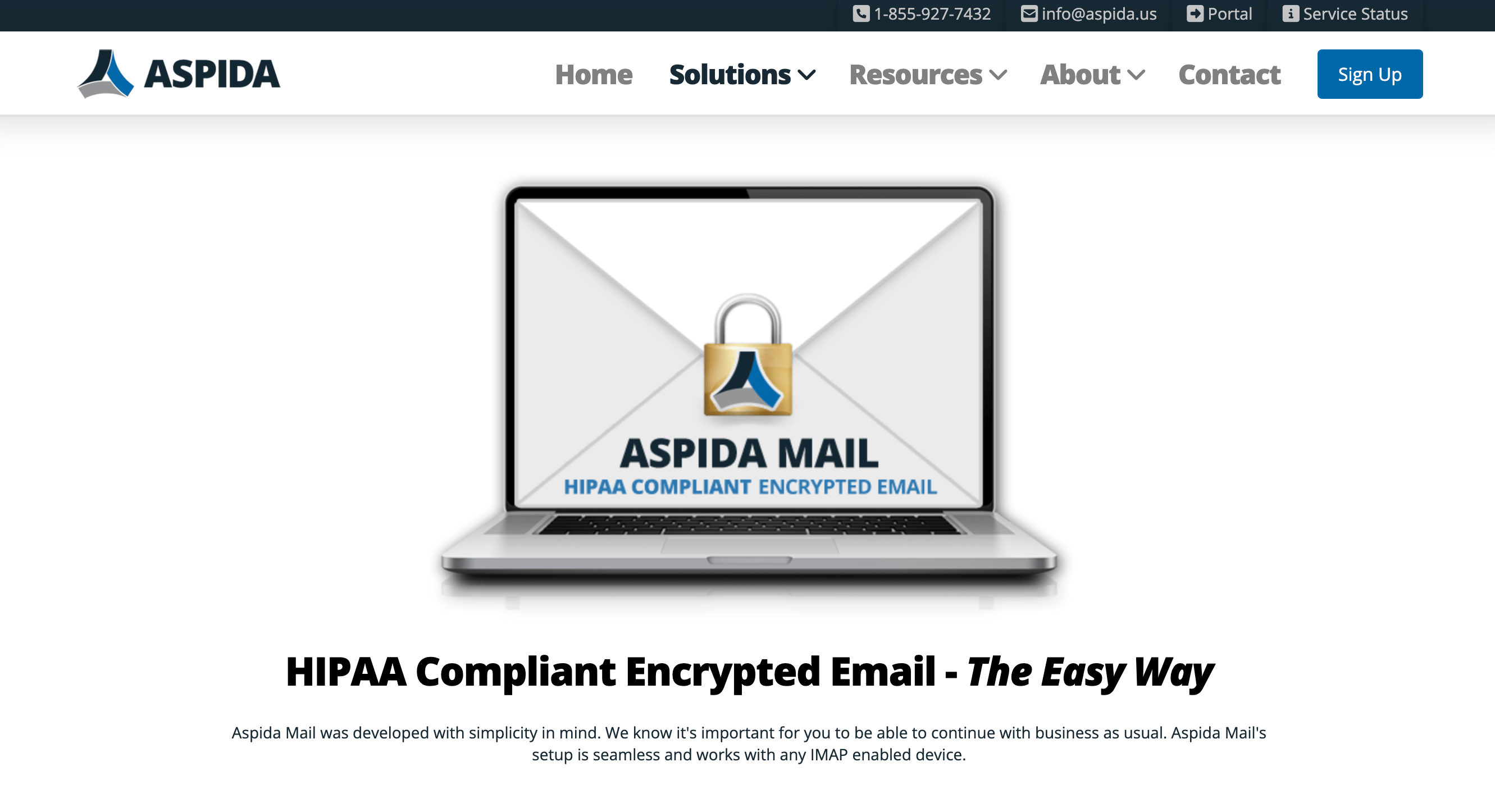
Key Features
- AES-256 encryption for emails in transit & at rest;
- Real-time spam filtering and malware protection;
- 6-year email backup and retention;
- Default business associate agreement;
- Content analysis for automatic encryption.
Pros & Cons
Pros Cons Simple setup and integration Limited storage (30GB per mailbox) compared to some competitors Comprehensive compatibility May lack some advanced features offered by larger email security platforms Flexible encryption options for new emails Outdated user interface
Plans & Pricing
Plans start at $10 per month for 1 mailbox and 30 GB of storage
HIPAA-compliant Email Providers FAQs
What are the requirements for achieving HIPAA-compliant emails?
HIPAA requires you to have a business associate agreement with email service providers, encrypt emails containing PHI, and retain all PHI-related communications for six years.
Also, you must ensure secure yet authorized access to all emails and patient data. These measures help protect sensitive health data while complying with HIPAA’s Privacy and Security Rules.
What are the identifying criteria for HIPAA-compliant emails?
A HIPAA-compliant email should be covered by end-to-end encryption, secure transmission protocols (such as TLS), unique user authentication, automatic logoff features, audit controls to track access and changes, and integrity controls to prevent unauthorized alterations.
Additionally, any HIPAA-compliant email should be sent via a service covered by a business associate agreement, include only the minimum necessary PHI, and be subject to retention policies.
The sender’s email system should also have mechanisms for secure storage and authorized access to archived messages containing PHI.
Is Gmail HIPAA-compliant to use?
Gmail is not HIPAA compliant by default but can be made HIPAA compliant under specific conditions. You need a paid Google Workspace account (not a free Gmail account), and Google must sign a Business Associate Agreement (BAA) with your organization.
The account needs proper configuration (encryption, access controls, and audit logging). Further, your team must be trained on proper email use for PHI, and the organization should implement additional security measures and clear policies on email usage.
Is sending PHI via email a HIPAA violation?
Sending Protected Health Information (PHI) via email is not automatically a HIPAA violation, but you must be careful. Proper safeguards need to be in place for compliance.
These include using encryption, limiting access to authorized personnel, obtaining explicit consent of recipients, verifying recipients, and using a secure HIPAA-compliant email system.
Organizations must have clear policies for handling PHI in emails and a Business Associate Agreement if using third-party email services.
Looking for more HIPAA-compliant tools? Check out this roundup list:
11 Best HIPAA Compliance Software: Key Features and Benefits



